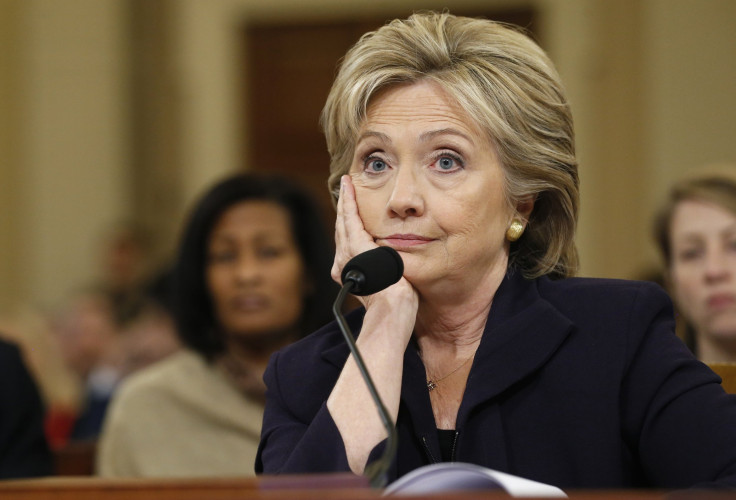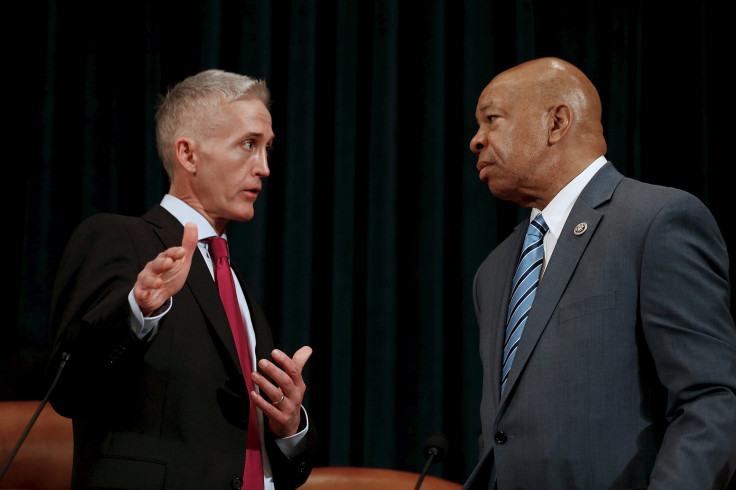Why Benghazi Controversy Won’t Stop Hillary Clinton From Becoming President

As Hillary Clinton sat in front of the House Select Committee on Benghazi on Thursday to talk about the four Americans killed during a 2012 attack on a diplomatic compound under her watch, the former U.S. secretary of state shot back at Republicans but largely kept her cool while defending herself with a good-natured attitude. And why not? With her campaign's laser focus on poll data, Clinton has to know that the events in Libya probably won't keep her from the White House.
While Clinton has been the front-runner in the Democratic presidential race since before she declared, the controversies over her actions in Benghazi and the private email account she used during her time as secretary of state have at times dragged down her campaign. But despite expectations that Republicans will use Thursday’s hearing against her in a general election contest, her testimony is unlikely to change many voters’ opinions in the long term.
"I don't think there’s a lot of evidence that suggests it will have much of an effect," David Hopkins, a professor of political science at Boston College who studies partisanship, said about the hearing. "I think the prior impressions voters have of Hillary Clinton are so ingrained at this point, both pro and con, that it would take a lot of new information to change people’s minds about her. And it’s not clear that there’s any kind of smoking gun that would transcend the predispositions that Republicans and Democrats have about her."
It is true that the controversy around Clinton’s email account and her involvement in the Benghazi incident have dug away at her poll numbers. She still maintains a strong lead over her main opponent in the Democratic race, Vermont Sen. Bernie Sanders, but her support has eroded significantly since she announced her campaign this summer. Clinton has a national polling average of 47.8 percent to Sanders’ 25.7, according to Real Clear Politics.

But in polls that measure Clinton’s trustworthiness or that ask specifically about the controversies she has faced, the former secretary of state struggles. In a CBS poll earlier this month, 71 percent of registered voters said it was inappropriate for Clinton to use a personal email address for work-related matters while she was secretary of state. Just under 30 percent of Democratic voters said the email issue would be important to them in the election, and nearly three-fourths of Republicans who said it would be important to them.
On trustworthiness, 68 percent of Democrats in the CBS poll said they found Clinton trustworthy. In a September Quinnipiac University poll, 63 percent of voters, including Democrats, Republicans and independents, thought she was not honest and trustworthy. Still, if Clinton doesn't win the White House, Libya probably won't be to blame.
Clinton has been in the public eye for many years, and has weathered plenty of controversies, both when she was first lady to President Bill Clinton and throughout her own time as a New York senator and then as secretary of state.
“She could be telling the absolute truth, and if you don’t like her, you won’t believe her. It’s classic communication theory, it’s called selective perception,” said Leonard Steinhorn, a professor of communications at American University in Washington who focuses on politics and media. “We dig in and double down based on what our biases are.”
Clinton wouldn't tell reporters how she thinks the hearing's going, but her expressions suggest probably pretty good pic.twitter.com/gsg4SoDMGG
— Liz Kreutz (@ABCLiz) October 22, 2015
But the details of whether Clinton is in the right or the wrong on her actions from 2012 are more complicated than many voters are willing to sort through, according to Hopkins.
“There are of course people who are not on either team,” Hopkins said. “This is the kind of issue that it’s difficult to see having an effect on those people because it’s a complicated issue. People who are in the center are typically less attentive to the news and what’s going on than people who pay more attention and have strong opinions.”
Still, Thursday morning Clinton’s campaign tweeted about her testimony with a link to background information on the Benghazi incident and what Clinton has done since then.
Hillary is testifying before @HouseBenghazi today. Here's what you need to know. https://t.co/1U6IIHE1pe
— Hillary Clinton (@HillaryClinton) October 22, 2015So far, there have been no huge revelations from the House Select Committee on Benghazi, which has caused Democrats to grow increasingly critical of the ongoing investigations. Republicans in Congress have been looking into the events in Benghazi for years, and have conducted seven other investigations on the terrorist attack, which killed four Americans, including Ambassador Chris Stevens. Criticisms have been leveled that there was not enough security at the diplomatic compound despite concerns over violence in Libya, and Republicans question why Clinton did not play a more active role in the aftermath.
In its investigation, the House Benghazi committee did discover that Clinton used a private email server to communicate about her work as secretary of state, but there is little evidence that her emails contained any classified or damning information. Clinton’s campaign has tried to dismiss the investigations as a partisan venture in the past, and just recently, House Majority Leader Kevin McCarthy, R-Calif., seemed to admit she might be right.
“Everybody thought Hillary Clinton was unbeatable, right? But we put together a Benghazi special committee. A select committee. What are her numbers today? Her numbers are dropping. Why? Because she's untrustable. But no one would have known that any of that had happened had we not fought to make that happen,” he said to Fox News Sept. 29.
Other Republicans have made similar comments in recent weeks, and Democrats have jumped on such remarks to call the Benghazi investigation into question. Rep. Elijah Cummings of Maryland, the committee’s ranking Democrat, has been outspoken about his critiques of the committee’s purpose.
“It is time, and it is time now, for Republicans to end this taxpayer-funded fishing expedition,” he said Thursday during Clinton’s hearing.
It could be that Benghazi will even end up helping Clinton if Democrats who have not decided about her see House Republicans picking on her or think she was treated unfairly. Rep. Trey Gowdy, R-S.C., the committee chairman, has said he told fellow Republicans not on the Benghazi panel to “shut up” because he does not want the committee to lose its legitimacy.
“A lot of it depends on when she is able to put a period at the end of this committee session or whether she leaves it with a colon or a comma,” Steinhorn said. “What she wants is a period. What she wants is to make this a teachable moment to talk about how we deal with extremism and political instability in the world.”
During her hearing, Clinton’s Twitter account tweeted commentary on the proceedings and promoted the importance of pursuing diplomacy in the face of the world’s many problems.
American diplomats cannot conduct their work from bunkers. Advancing US interests often means going to unstable regions.
— Hillary Clinton (@HillaryClinton) October 22, 2015As she moves past Thursday's hearing, all Clinton can do is continue to stay out of the fray around the committee, try to change the conversation to issues she wants to discuss and hope that voters will get tired of hearing about the same controversies by the general election, experts said.
"Both the media and the Republicans are in danger of Benghazi fatigue. Because if it seems like its just another opportunity for Republican Congressional leaders to point their fingers at Hillary Clinton, then it ... just becomes public spectacle," Steinhorn said.
© Copyright IBTimes 2024. All rights reserved.






















